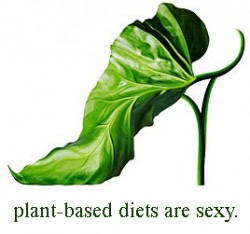We are all going to die.
Paleo eaters, vegans, junk food junkies, gourmands, raw foodies alike, we are all going to die. No matter what we eat or how much we exercise or how many days a week we juice our organic vegetables, we are going to die. Hard as it is to believe, death is certain.
What is less certain is how we will use this miraculous flash of life we’ve been given before that inevitability occurs. From dust we have come and to dust we will return.
So how do we use the time in between?
A life based solely on self-preservation is as inconsequential as the dust we will become. The wisdom of all the world’s great spiritual traditions can be boiled down to this: In order for our lives to have meaning that transcends the certain death of these bodies, we must live for something more than ourselves. As the prayer says, “It is in dying to self that we are born to eternal life.”
The good news is that we have an opportunity at every meal to stand up for justice, to stand up for the weak, to care for the environment and to serve all beings great and small. In doing so, we touch a love for all beings that is the union of yoga, the awakened heart and mind of the Buddha, the very essence of immortality.
We kill 10 billion land animals in the U.S. alone every year for food, and if we haven’t been living on the moon lately, we have surely seen some of the undercover investigations capturing the egregious conditions these sentient creatures are systematically forced to endure.
 For example, more than 90% of this country’s 280 million egg laying hens are confined to windowless buildings and barren wire cages so small they cannot spread their wings for the entirety of their lives. Science, and common sense, tells us these sentient beings must endure constant suffering. In fact, every animal product we consume is tainted at least somewhere in the process with immense suffering.
For example, more than 90% of this country’s 280 million egg laying hens are confined to windowless buildings and barren wire cages so small they cannot spread their wings for the entirety of their lives. Science, and common sense, tells us these sentient beings must endure constant suffering. In fact, every animal product we consume is tainted at least somewhere in the process with immense suffering.
It’s no accident that factory farms and slaughterhouses are kept shrouded in secrecy and as hidden from public view. The systematic cruelties that happen in these places are enough to shock the conscience of even the most average consumer.
Scientists tell us too that animal agriculture is probably the greatest threat to the environment today. The human population is too large and the resources involved in animal agriculture too great to sustain. Animal agriculture is an undeniable threat to water and air quality, and a leading contributor of deforestation, global warming, loss of biodiversity, and world hunger.
And yet, an overwhelming majority of us continue purchasing and consuming the products that cause unconscionable mass scale suffering to billions of feeling and emotional beings as well as the destruction of our one and only planet. Sure, there are many people who remain unaware of the cruelty, who are blissfully ignorant of the environmental impact of our dietary choices, but I’m betting that if you’re reading this article, in this publication, you are one of the well-informed.
So why hasn’t the vegan revolution of our utopian fantasies happened yet?
For one, many of us worry that our health will suffer if we give up animal products. That makes sense considering that generations of us were reared on propaganda (e.g. “milk does a body good”) fed to us not by the objective scientists we thought were behind the ads, but by the billion dollar meat and dairy industries.
Combining that with the absolute cacophony of nutritional theories spinning through popular culture at any given moment, it’s no wonder we’re all confused about what we should be eating.
For every ailment, whether it be headaches, backaches, fatigue, gastrointestinal distress or whatever it is, there are at least a half a dozen potential culprits. Maybe it’s gluten, or grains, or soy. Perhaps it’s Aspartame, or Candida, MSG or GMOs.
We’re all just trying to figure out how to be healthy and feel good so we can get on with our lives. And there’s nothing wrong with that. Except that in this quest for better health, we can lose sight of the bigger picture.
In Eastern philosophy there’s this idea that what we eat is a central part of our spiritual path, our path towards peace, happiness and the end of suffering. The right diet goes beyond combining amino acids in their optimal ratios, or consuming as many superfoods as we can afford.
The right diet encompasses an understanding of our interconnection with all life and a respect for all beings.
Never in history has diet been more important than it is now. What we eat will determine the future of our planet. Our food choices determine the fate of billions of other sentient beings and so here’s the crux of the issue. Even if we could preserve or extend our lives by eating other living beings, or their cruelly procured by-products, we still need to ask ourselves if the cost to others is not too great.
Is it possible that there is something that matters even more than ourselves? More than a perfectly functioning digestive track?
 As an aside, it is worth noting that modern nutrition science tells us that a plant-based diet is not only appropriate for all people regardless of blood type, activity level, or stage of life (childhood, pregnancy, late adulthood), but is in fact probably the healthiest diet for all human beings, making the ethical question really kind of academic.
As an aside, it is worth noting that modern nutrition science tells us that a plant-based diet is not only appropriate for all people regardless of blood type, activity level, or stage of life (childhood, pregnancy, late adulthood), but is in fact probably the healthiest diet for all human beings, making the ethical question really kind of academic.
We can, in fact, be perfectly healthy eating plants.
But the point is that amidst the flood of nutritional advice counseling us in a million different directions, we need to have an unwavering ethical conviction to avoid causing harm to other beings even if it means sacrificing some degree of personal health.
Every time we choose the veggie burger over the bar-b-que sandwich, or the bean burrito over the chicken fingers, we choose compassion over self-interest.
With every meal we eat, we can give meaning to our lives.
What good are any of our spiritual practices unless we make an effort to apply them in our everyday lives? Every time we sit down to eat, we can practice selflessness and kindness. Gandhi said “my life is my message.” More than at any other point in history, the diet we choose is the most powerful statement of who we are and what we care about. If we choose wisely, we can continue to live on in the message of our lives long after the dust has settled.
Below is a meal blessing, the five contemplations of Zen master Thich Nhat Hanh which can help us remember the impact of our dietary choices.
This food is a gift of the earth, the sky, numerous living beings and much hard and loving work.
May we eat with mindfulness and gratitude so as to be worthy to receive this food.
May we recognize and transform unwholesome mental formations, especially our greed and learn to eat with moderation.
May we keep our compassion alive by eating in such a way that reduces the suffering of living beings, stops contributing to climate change, and heals and preserves our precious planet.
We accept this food so that we may nurture our brotherhood and sisterhood, build our Sangha and nourish our ideal of serving all living beings.
Love elephant and want to go steady?
Sign up for our (curated) daily and weekly newsletters!
Apprentice Editor: Alicia Wozniak/Editor: Rachel Nussbaum
Photo: elephant journal archives












Read 1 comment and reply